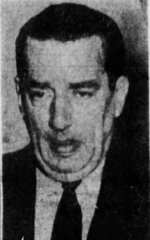 The Brooklyn Daily Eagle (Brooklyn, NY) - April 24, 1950 Camilo Leyra, Jr.’s 80-year-old father failed to show up at work on January 10, 1950. At about 3:00, Leyra, Jr. and two of his associates went to his father’s house to check on him. They found Leyra, Sr. and his wife Catherine beaten to death in their Brooklyn apartment. No money had been taken, and the breakfast table was set for three. The police assumed the killer was a “welcome guest,” and immediately suspected Leyra, Jr. had killed his parents to gain control of his father's business. Over the next few days, the police constantly questioned 50-year-old Leyra, allowing him only a few hours of rest. While he was attending his parents’ funeral, the police secretly wired a room. Leyra had a terrible sinus infection and had asked to see a physician. After the funeral, the police introduced him to Dr. Helfand, who Leyra assumed was a physician. He was actually a psychiatrist. They were alone in the wired room for about an hour and a half, during which the “doctor” mentally tortured Leyra. Leyra continually repeated how confused and tired he was, and the psychiatrist made him believe that if he didn't confess the police would think the crime was premeditated. Leyra, in a state of complete exhaustion, asked to see the police captain. After confusing the captain for the doctor multiple times, Leyra confessed to murdering his parents. At Leyra’s trial in April and May of 1950, Judge Samuel S. Leibowitz instructed the jury to disregard any comments that had been made regarding the legitimacy of Leyra’s confession. Leyra was convicted on May 4, 1950 and sentenced to death. In April 1951, the New York Court of Appeals reversed the conviction and ordered a new trial because the confession with the psychiatrist was illegally obtained in violation of the Due Process Clause of the 14th Amendment. Leyra had a second trial, during which the confessions he made to the police directly after his meeting with the psychiatrist were used as evidence. He was once again convicted and sentenced to death. After exhausting all his options in the State courts, Leyra sought Habeas Corpus in federal court. The Supreme Court granted certiorari, and ruled all the confessions made on the evening in question were invalid. The conviction was reversed and Leyra moved into his third trial. Leyra was convicted and sentenced to death for a third time. Shortly after, the New York Court of Appeals reversed the conviction and ordered that the indictment be dismissed. The Court stated that “the prosecution has produced not a single trustworthy bit of affirmative, independent evidence connecting [the] defendant with the crime.” Leyra was released April 28, 1956. – Will Robinson
|